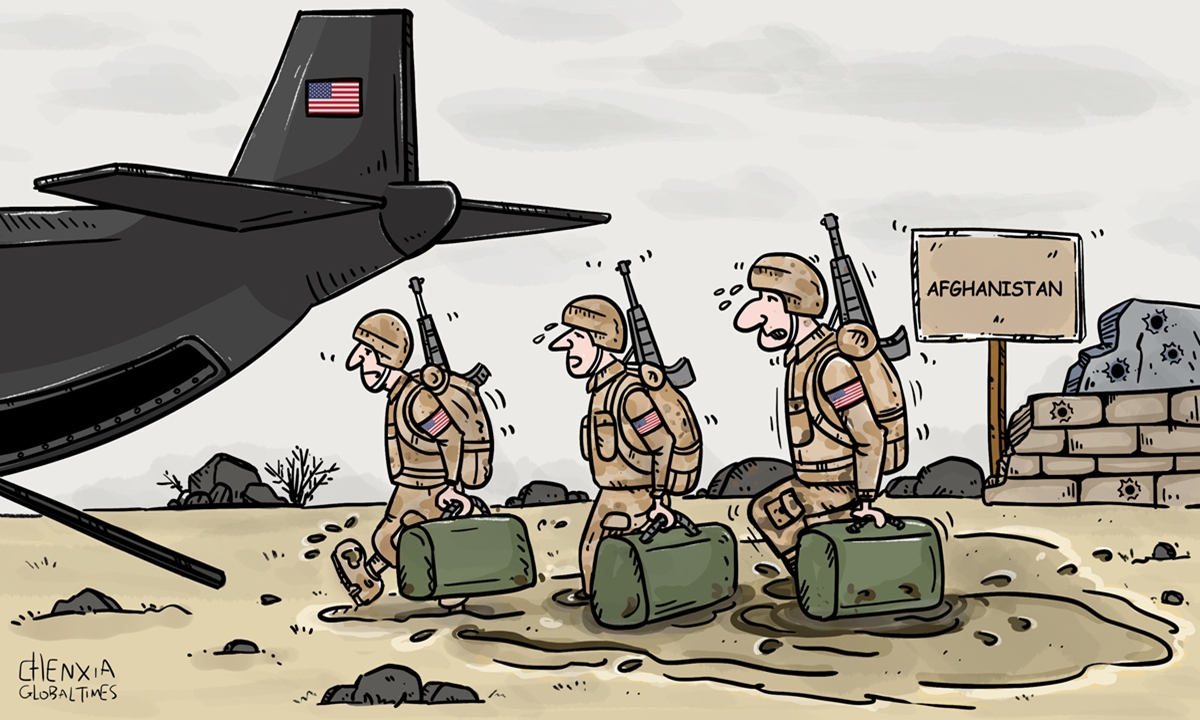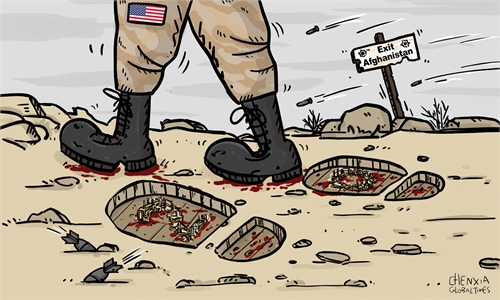
Illustration: Chen Xia/GT
As the US' withdrawal from Afghanistan continues, those in Washington opposing the military pullout are raising their voices. They have warned against the serious consequences for the region the US's "retrograde" could bring, including China, Russia and Iran filling a power vacuum in the war-torn country. According to Japan's media outlet Nikkei Asia, David Helvey, acting assistant secretary of defense for the US's Indo-Pacific security affairs, said at a US Senate Armed Services Committee hearing on Thursday that, "China does have an interest in Afghanistan." Helvey added, "That China's influence could be used to undermine stability, instead of reinforce stability or support stability, obviously, that's something that we've got concern about."This reflects Washington's contradictory attitude and its own dilemmas when it comes to the Afghan issue. On the one hand, Washington is eager to get rid of the Afghanistan burden despite the mess it has created. On the other hand, it views the efforts by other countries to help stabilize the situation as raw ambition to seize control in the power vacuum.
The Afghan war the US waged after the 9/11 attacks has lasted for nearly 20 years. During this time, Washington eradicated terrorism on its own soil, but left a mess in Afghanistan. The US cannot win this war that has lasted for two decades. Any further involvement will mean that Washington will become increasingly incapable of dominating Afghan affairs. So the US is withdrawing its troops even though conditions are not ripe to do so. The irresponsible pullout has led to many deplorable results. One is recent terrorist attacks that are only intensifying.
The US is now facing a serious dilemma with its Middle East and West Asia policy. No matter the Afghan issue or the latest Israel-Palestine conflicts, Washington clearly has become increasingly unable to cope with thorny issues in the Middle East as it wished. From President Obama to Trump to Biden, there is an overall trend that Washington is shrinking its footprints in the Middle East and West Asia. With this trend continuing, many interpretations in the US hold that China is ambitious to fill the vacuum left by Washington. But Beijing has no interest in playing the role as a challenger to the US in the Middle East and West Asia.
Take the Afghan issue as a case in point. The US is the fundamental reason for the turbulence in Afghanistan, while China is always a force that has been committed to fostering peace in its western neighbor. China's participation in the international society's efforts to promote the resolution of the Afghan issue is not meant to fill any power vacuum. China is willing to see stability and peace in Afghanistan because it conforms to China's national interests to maintain stability and peace on China's western border.
State Councilor and Foreign Minister Wang Yi elaborated China's position on the Afghan situation earlier this month at the second "China+Central Asia" (C+C5) Foreign Ministers' Meeting. He emphasized that the peace and reconciliation process in Afghanistan should first of all implement the principle of "Afghan-led and Afghan-owned." He also said that as close neighbors of Afghanistan, Central Asian countries should make due contributions to the final settlement of the Afghan issue. The Shanghai Cooperation Organization (SCO) should also play its due role for the long-term peace and stability in Afghanistan, he said.
China's participation in the Afghan issue is carried out within multilateral frameworks, such as the UN and the SCO. It hopes to work with countries concerned to jointly promote stability in Afghanistan. There is no such a strategy that China wants to dominate the Afghan issue.
However, many nervous nellies in Washington tend to overly interpret China's involvement in the region. For example, US Republican Sen. Marsha Blackburn of Tennessee even raised the possibility of China using its Belt and Road Initiative (BRI) to gain "unfettered access" across Afghanistan to Iran - potentially connecting the two American rivals. Her wild imagination is a stereotyped malicious misinterpretation of the BRI from the geopolitical perspective. China doesn't have such strategic arrangement that is linked to Iran in Afghanistan at all.
The US' disorderly and irresponsible withdrawal from Afghanistan to relieve itself from the burden of the war has messed up the country and the region. Meanwhile, it has treated the endeavors of other countries and regional organizations to foster stability as an eyesore. The world has now known the US' petty mind well. They can see what awful mess it has left.
The author is a professor at the Middle East Studies Institute of the Shanghai International Studies University. opinion@globaltimes.com.cn



